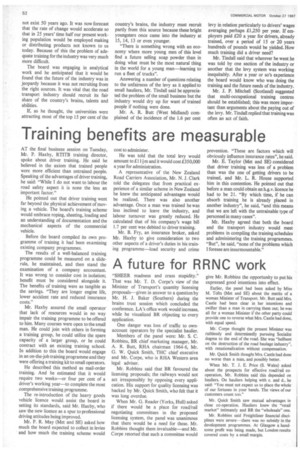A future for RRNC work
Page 54

If you've noticed an error in this article please click here to report it so we can fix it.
"SHEER madness and crass stupidity." That was Mr. T. D. Corpe's view of the Minister of Transport's quantity licensing proposals—given in answer to a question by Mr. H. J. Baker (Southern) during the brains trust session which concluded the conference. LA's office work would increase, while he visualized BR objecting to every application.
One danger was loss of traffic to ownaccount operators by the specialist haulier.
Members of the panel were: Mr. S. C. Robbins, BR chief marketing manager, Mr. A. R. Butt, RHA chairman 1964-6, Mr. G. W. Quick Smith, THC chief executive and Mr. Corpe, who is RHA Western area legal adviser.
Mr. Robbins said that BR favoured the licensing proposals; the railways would not act irresponsibly by opposing every application. His support for quality licensing was backed by Mr. Quick Smith, who felt that it was long overdue.
When Mr. G. Reader (Yorks, Hull) asked if there would be a place for road/rail negotiating committees in the proposed licensing system, the panel was unanimous that there would be a need for these. Mr. Robbins thought them invaluable—and Mr. Corpe retorted that such a committee would give Mr. Robbins the opportunity to put his expressed good intentions into effect.
Earlier, the panel had been asked by Miss M. Tofts (Met and SE) about the merits of a woman Minister of Transport. Mr. Butt said Mrs. Castle had been clear in her intentions and swifter than a man in carrying them out; he was all for a woman Minister if the other party could provide one to reverse what Mrs. Castle had done, with equal speed.
Mr. Corpe thought the present Minister was ruthlessly and determinedly pursuing Socialist dogma to the end of the road. She was "hellbent on the destruction of the road haulage industry", with renationalization without compensation.
Mr. Quick Smith thought Mrs. Castle had done no worse than a man, and possibly better.
When Mr. T. J. E. Price (S. Wales) asked about the prospects for effective road/rail cooperation, Mr. Robbins said this depended on hauliers. On hauliers helping with c. and d., he said: "You must not expect us to place the whole of our fortunes in your hands. The views of our customers count too."
Mr. Quick Smith saw mutual advantages in close co-operation. Hauliers knew the "retail market" intimately and BR the "wholesale" one.
Mr. Robbins said Freightliner financial disci plines were severe there was no subsidy in the development programmes. At Glasgow a handsome profit was being made, but London results covered costs by a small margin.






















































































































